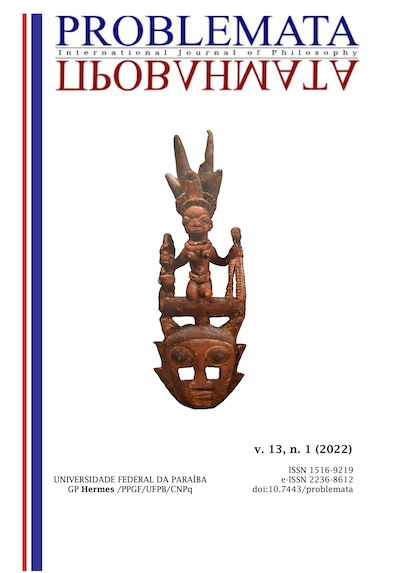EPISTEMOLOGY AS A TRACE OF THE ONTOLOGICAL DIFFERENCE BETWEEN THE HUMAN BEING AND THE COMPUTER
DOI:
https://doi.org/10.7443/problemata.v13i1.61418Keywords:
Chess, Ontology, Epistemology, Artificial intelligenceAbstract
Computational technology and, especially, artificial intelligence, amaze, in our days, by the magnitude and novelty of its fruits. Their successes, and the intellectual improvement that they show in some fields reserved until recently for human beings, make us wonder if computers will soon think like us, understand and have consciousness, but at a higher level than ours. In this work we propose to address these issues from the perspective of technological evolution in chess. We will make a comparison between human thought and the cognitive operations of the computer in chess; and, from there, we will draw conclusions regarding epistemology and the ontological differences between human and machine. All of this will help us to shed light on the issues raised.
Downloads
References
FERNÁNDEZ AGIS, Domingo y RAMÍREZ NARANJO, Jabel Alejandro, Muros: orden matemático y ontología del desorden. Reflexiones sobre el legado de Alexandre Grothendieck, Revista CTS, vol 16 nº 48: 249-273, 2021.
FISHER, Lars, ¿El fin de los programas específicos para jugar al ajedrez?”, Investigación y ciencia, 2017.
LÓPEZ RAMOS, Ana, “H. G. Gadamer”, A parte rei vol 21:1-6, 2002.
LÓPEZ SÁENZ, María del Carmen, La hermenéutica filosófica de H-G. Gadamer. En busca de la verdad. Madrid: Dykinson, 2018.
GARCÍA, Leontxo, El centauro Carlsen: neuronas + chips. El país. 5 de mayo de 2019.
HUSSERL, Edmund. Die Krisis der Europäischen Wissenschaften und die transzendentale Phänomenologie. Husserliana VI. Berlin: Springer, 1976.
KAN, Ilia, Leyes fundamentales del ajedrez. Barcelona: Martínez Roca, 1976.
KARPOV, Anatoli y MATSUKEVICH, A, La estrategia en el ajedrez. Cómo valorar posiciones y trazar planes. Barcelona: Hispano Europea, 2010.
KASPAROV, Gary, Cómo la vida imita al ajedrez. México: Grijalbo, 2007.
KASPAROV, Gary, Chess, a Drosophila of reasoning, Science, vol 362, nº 6419: 1087, 2020.
KING, Daniel, Kasparov contra Deepblue. Barcelona: Paidotribo, 1997.
KROGIUS, Nicolas V, La psicología del ajedrez. Barcelona: Martínez Roca, 1972.
SÁNCHEZ MECA, David, Historia de la filosofía antigua y medieval, Madrid: Dykinson, 2013.
SAUTOY, Marcus du, Programados para crear, Barcelona: Acantilado, 2020.
SHANNON, Claude, Programming a computer for playing chess, Philosophical Magazine vol 41, nº 314: 256-275, 1950.
SILVER, D., Hubert, T., SCHRITTWIESER, I.A., LAI, M., GUEZ, A., LANCTOT, M., SIFRE, L., KUMARAN, D., GRAEPEL, T., LILLICRAP, T., SIMONYAN, K., HASSABIS, D., Mastering Chess and Shogi by Self-Play with a General Reinforcement Learning Algorithm, arXiv:1712.01815 [cs.AI], 2017.
TIERCELIN, Claudine. La connaissance metaphysique, Leçons inaugurales du Collège de France. Paris: OpenEdition books, 2011.
TIERCELIN, Claundine, La métaphysique et les sciences. Les nouveaux enjeux, Revue de la societe de philosophie des sciences vol 3 nº 1, 2016.
Downloads
Published
Issue
Section
License
Copyright (c) 2022 Jabel A. Ramírez Naranjo

This work is licensed under a Creative Commons Attribution 4.0 International License.
Authors who publish with this journal agree to the following terms:
- Authors retain copyright and grant the journal right of first publication with the work simultaneously licensed under a Creative Commons Attribution License that allows others to share the work with an acknowledgement of the work's authorship and initial publication in this journal.
- Authors are able to enter into separate, additional contractual arrangements for the non-exclusive distribution of the journal's published version of the work (e.g., post it to an institutional repository or publish it in a book), with an acknowledgement of its initial publication in this journal.
-
- Authors are permitted and encouraged to post their work online (e.g., in institutional repositories or on their website) prior to and during the submission process, as it can lead to productive exchanges, as well as earlier and greater citation of published work (See The Effect of Open Access).





